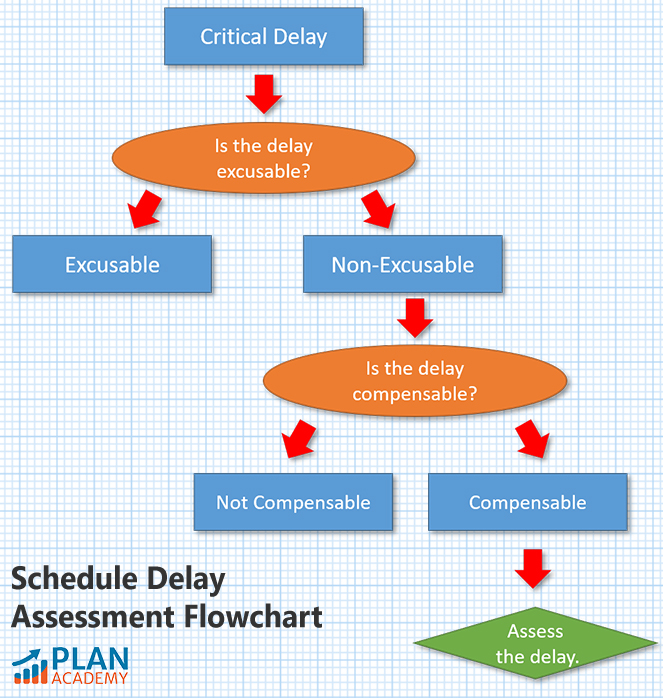A 2020 report on worldwide Construction Claims states the global average value of a construction delay dispute to be a staggering US$30.7 million, a trend that has climbed upward from 2010. The report also indicates that the average dispute took 15 months to reconcile. You can read the full report from Arcadis here.
Although claims and disputes are the inevitable result of delays to a project, for those new to project controls a good starting place is understanding the different types of schedule delays that can occur.
The causes of delays on large-scale construction projects are many and varied; changes orders, financial issues, adverse weather, supplier delays, poor design, lack of experience (owner or contractor) or unforeseen ground conditions. These are just a few of the most common causes of delay. However each cause corresponds to a particular type of schedule delay. The classification of delay types help us to understand if the delay:
- will impact the project’s delivery date or not
- will impose unplanned expenses to the contractor or the owner (or not)
- was caused by action (inaction) of 2 or more parties involved in the construction, typically the owner and the contractor
Having trouble documenting your delays? Grab a copy of our handy Construction Delay Tracker Log – it’s free.
What are the Types of Schedule Delays in Construction?
Let’s go through the different types of schedule delays in Construction projects.
Excusable / Non-Excusable Schedule Delays
Excusable delays are caused by conditions that are reasonably unforeseen and not within the contractor’s / owner’s control.
Examples of this kind of delay include:
- Labor strikes
- Fires, floods, earthquakes and most natural disasters
- Changes initiated by the owner
- Errors and omissions in the plans, design docs and specifications
- Differing site conditions or concealed conditions
- Lack of action by governmental or oversight bodies
- Intervention by outside agencies
Often the construction contract will outline valid excusable delay causes.
Excusable delays are those that are beyond the control of the owner/contractor and leaves them without fault or negligence.
Non-Excusable Delays
Non-excusable delays are a result of a delay that was within control of the Owner/Contractor. The Owner/Contractor is fully responsible for the activity delays. Examples of non-excusable delays include:
- Delayed mobilization
- Delayed submission of submittals
- Overall late performance and execution
- Late performance of subcontractors
- Late performance by suppliers
- Faulty workmanship by the contractor or subcontractor
- A project specific labor strike caused by either the contractor’s unwillingness to negotiate or by unfair job practices
Non-excusable delays can be either compensable or non-compensable or can result in an extension of time.
Critical Delays (or non-Critical Delays)
Whether a the type of schedule delay is excusable or not, it’s important to also assess whether the delay is Critical or not. A Critical schedule delay is one that impacts the project’s delivery date. If a delay has no effect to activities on the project’s Critical Path, then the delay may not warrant too much attention, unless of course there is some substantial money involved.

Compensable Delays
This is where the rubber hits the road. A compensable delay is one where there’s going to be some compensation involved for the delay to the project. That means that the owner or contractor is liable for a extension of time or cost compensation or both. The cost compensation is to account for damages or extra costs associated with the delay.
A compensable delay will be a non-excusable delay, so the list of causes above applies here.
Concurrent Delays
There are many moving parts between an owner and a contractor (and subs or suppliers) on a construction project and, at times, a concurrent delay can occur. This type of schedule delay happens when 2 or more parties are at fault. The complexity here lies in determining to what extent each party contributed to the delay. There are some technical methods of analyzing schedules that can assist in this determination. The overlapping of delays makes it difficult to analyze and factors like the duration of the delay, time of occurrence of the delay and float ownership have to be carefully considered in the technical analysis.
All delays in a Construction schedule can have an impact to the project, whether it be to the cost, to the schedule or to the reputation of those involved. To help determine who is at fault, scheduling experts have devised an entire field under the heading “Forensic Schedule Analysis”. An forensic schedule analyst is someone who can use forensic techniques to determine the root cause of the delay and to help assess responsibility.
Want to learn more about Forensic Schedule Analysis?
Check out our course – Delay Detective

